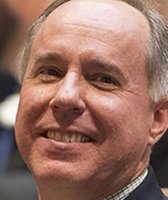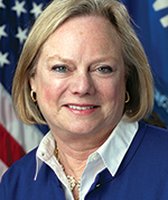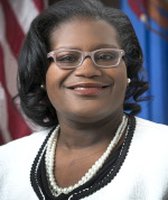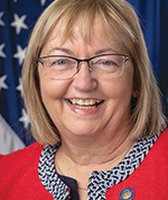Stand up for the facts!
Our only agenda is to publish the truth so you can be an informed participant in democracy.
We need your help.
I would like to contribute
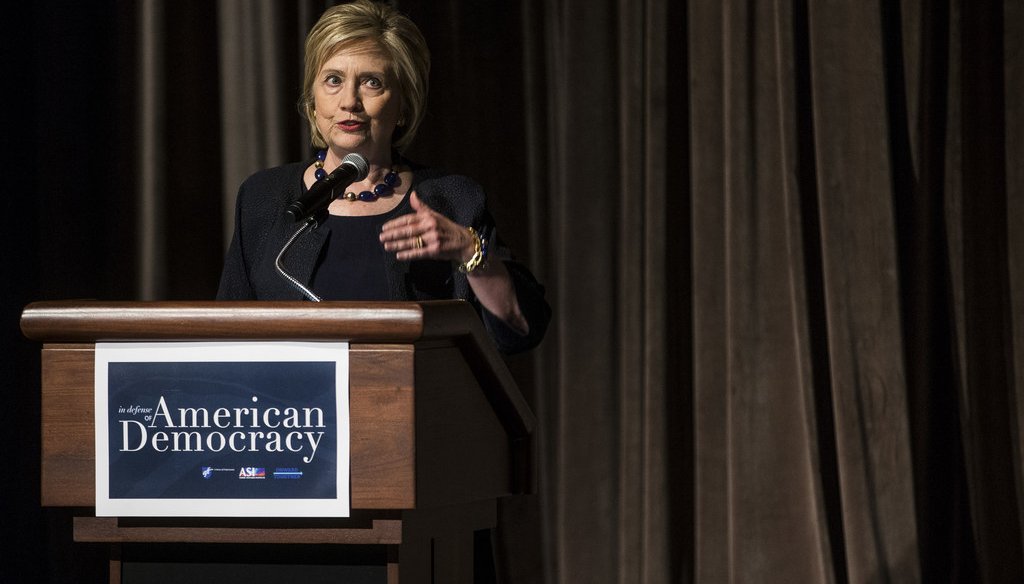
Former Secretary of State Hillary Clinton delivers a keynote speech during the American Federation of Teachers Shanker Institute Defense of Democracy Forum at George Washington University on September 17, 2019 in Washington, DC. (Getty Images)
PolitiFact Wisconsin readers are fascinated by Hillary Clinton’s ongoing criticism of the state’s voter ID law.
Indeed, the former secretary of state’s most recent version of the claim was our most-clicked factcheck of August 2019.
Here is a look at our monthly "High Five:"
1. Clinton: Between 27,000 and 200,000 Wisconsinites were "turned away" from the polls in 2016 due to lack of proper identification.
Clinton has repeatedly found herself at odds with the facts on Wisconsin’s voter ID law, which was in place for the first time in the 2016 election that pitted her against Republican Donald Trump.
Clinton returned to the topic Sept. 17, 2019, in a speech at George Washington University, where she discussed what she called voter suppression.
That’s when she made the claim of 27,000 to 200,000 people being turned away.
Ken Mayer, a University of Wisconsin professor whose study may be part of what Clinton is relying on, told us that his review "doesn’t get you anywhere close to (Clinton’s) numbers."
We rated Clinton’s claim Pants on Fire.
2. Attorney General Josh Kaul: People convicted of felonies or under restraining orders "can buy a firearm without going through a background check."
All purchases from firearms dealers are subject to state and federal requirements that include a criminal background check. But Kaul, a Democrat, was right that Wisconsin is among the states with no oversight of gun sales between private parties.
We rated the claim True.
3. Examining incarceration rates in ZIP code 53206
"Coming from the most incarcerated ZIP code in our state, I know how much opportunity means for our communities of color," Lt. Gov. Mandela Barnes tweeted on May 4, 2019.
The tweet caught our attention -- mainly since it echoed a claim many politicians have stated as fact over the years when characterizing 53206, a Milwaukee ZIP code with a host of deep-seated problems.
Analyzing the claim is complicated by many factors, from difficulty in obtaining solid data to the different ways that data can be sliced: Census tract vs. ZIP code vs. city vs. metro area. There’s this problem as well: Does "most incarcerated" mean those in prison now, or anyone who has served time in the past?
That prompted us to set aside the Truth-O-Meter and look more broadly at the issue.
On Feb. 28, 2019, Marc V. Levine, founding director of the Center for Economic Development at the University of Wisconsin-Milwaukee, issued a study titled "Milwaukee 53206: The Anatomy of Concentrated Disadvantage." The bottom line, from Levine’s report:
"Thus, even if characterizations of Milwaukee 53206 as the ‘most incarcerated’ ZIP code in America are hyperbole, this should not obscure the reality that mass incarceration is an integral component in the ‘ecosystem’ of concentrated disadvantage that continues to weigh on this beleaguered neighborhood."
That point is one that no one disputes.
And that, of course, is the underlying point politicians such as Barnes are making when they cite the status of 53206 -- even though it often gets blown out of proportion.
4. Wisconsin Assembly GOP: Say Gov. Tony Evers ‘canceled’ the sales tax holiday this year.
Wisconsin Republicans set up a sales tax holiday in 2018, giving consumers a pass for many categories of clothing, computers and school supplies. There was no such holiday in 2019.
But you can’t cancel something that was expressly created as a one-time occurrence.
Republicans could have introduced a new bill creating another sales tax holiday this year, but they didn’t. And comments from Evers showing a lack of support for such a measure didn’t come until months after Republicans would have needed to broach the subject.
We rated this claim False.
5. State Sen. Alberta Darling on WEDC CEO Mark Hogan: "Gov. Evers asked the director of WEDC to stay on."
Darling, R-River Hills, made this claim Sept. 4, 2019 in a Joint Finance Committee meeting, claiming the Democratic governor had developed an affinity for the Republican-appointed head of the agency, which has drawn criticism for bad loans, failures to verify created jobs and other matters.
Thanks to a series of lame-duck bills put in place after Evers’ November 2018 election win, Republicans made sure Evers would not get control of WEDC until Sept. 1, 2019.
Meanwhile, Hogan announced in June 2019 that he would be leaving the agency in fall 2019, which officials said he had previously told both Walker and Evers. In an Aug. 26 letter to Evers, Hogan revealed his last day would be Sept. 3.
The timeline didn’t allow much space for Evers to extend Hogan's stay, since Hogan left the agency two days after Evers gained oversight power.
And Evers’ staff said no such request was made — in September or before.
We rated Darling’s claim False.
Our Sources
PolitiFact Wisconsin









